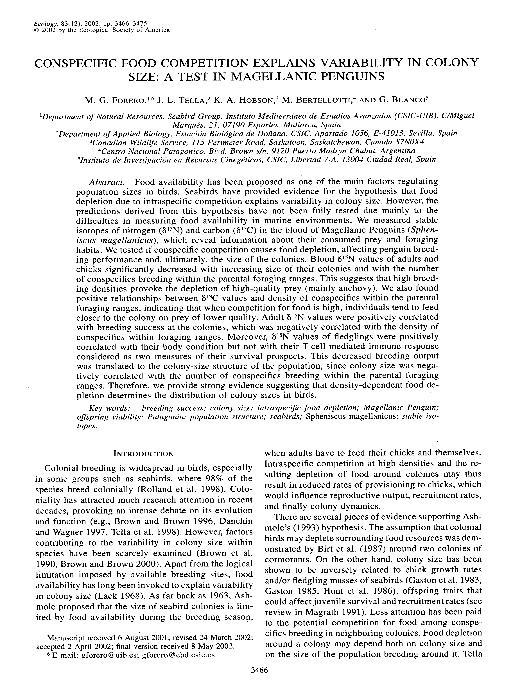Artículo
Conspecific food competition explains variability in colony size: a test in magellanic penguins
Fecha de publicación:
12/2002
Editorial:
Ecological Society of America
Revista:
Ecology
ISSN:
0012-9658
Idioma:
Inglés
Tipo de recurso:
Artículo publicado
Clasificación temática:
Resumen
Food availability has been proposed as one of the main factors regulating population sizes in birds. Seabirds have provided evidence for the hypothesis that food depletion due to intraspecific competition explains variability in colony size. However, the predictions derived from this hypothesis have not been fully tested due mainly to the difficulties in measuring food availability in marine environments. We measured stable isotopes of nitrogen (δ15N) and carbon (δ13C) in the blood of Magellanic Penguins (Spheniscus magellanicus), which reveal information about their consumed prey and foraging habits. We tested if conspecific competition causes food depletion, affecting penguin breeding performance and, ultimately, the size of the colonies. Blood δ15N values of adults and chicks significantly decreased with increasing size of their colonies and with the number of conspecifics breeding within the parental foraging ranges. This suggests that high breeding densities provoke the depletion of high‐quality prey (mainly anchovy). We also found positive relationships between δ13C values and density of conspecifics within the parental foraging ranges, indicating that when competition for food is high, individuals tend to feed closer to the colony on prey of lower quality. Adult δ15N values were positively correlated with breeding success at the colonies, which was negatively correlated with the density of conspecifics within foraging ranges. Moreover, δ15N values of fledglings were positively correlated with their body condition but not with their T‐cell mediated immune response considered as two measures of their survival prospects. This decreased breeding output was translated to the colony‐size structure of the population, since colony size was negatively correlated with the number of conspecifics breeding within the parental foraging ranges. Therefore, we provide strong evidence suggesting that density‐dependent food depletion determines the distribution of colony sizes in birds.
Palabras clave:
BREEDING SUCCESS
,
COLONY SIZE
,
MAGELLANIC PENGUIN
,
PATAGONIA
Archivos asociados
Licencia
Identificadores
Colecciones
Articulos(CCT-CENPAT)
Articulos de CTRO.CIENTIFICO TECNOL.CONICET - CENPAT
Articulos de CTRO.CIENTIFICO TECNOL.CONICET - CENPAT
Citación
Forero, M. G.; Tella Escobedo, José Luis; Hobson, K. A.; Bertellotti, Néstor Marcelo; Blanco, G.; Conspecific food competition explains variability in colony size: a test in magellanic penguins; Ecological Society of America; Ecology; 83; 12; 12-2002; 3466-3475
Compartir
Altmétricas




